Sir John Monash, Personal Files Book 5, 25 May - 10 June 1915, Part 4
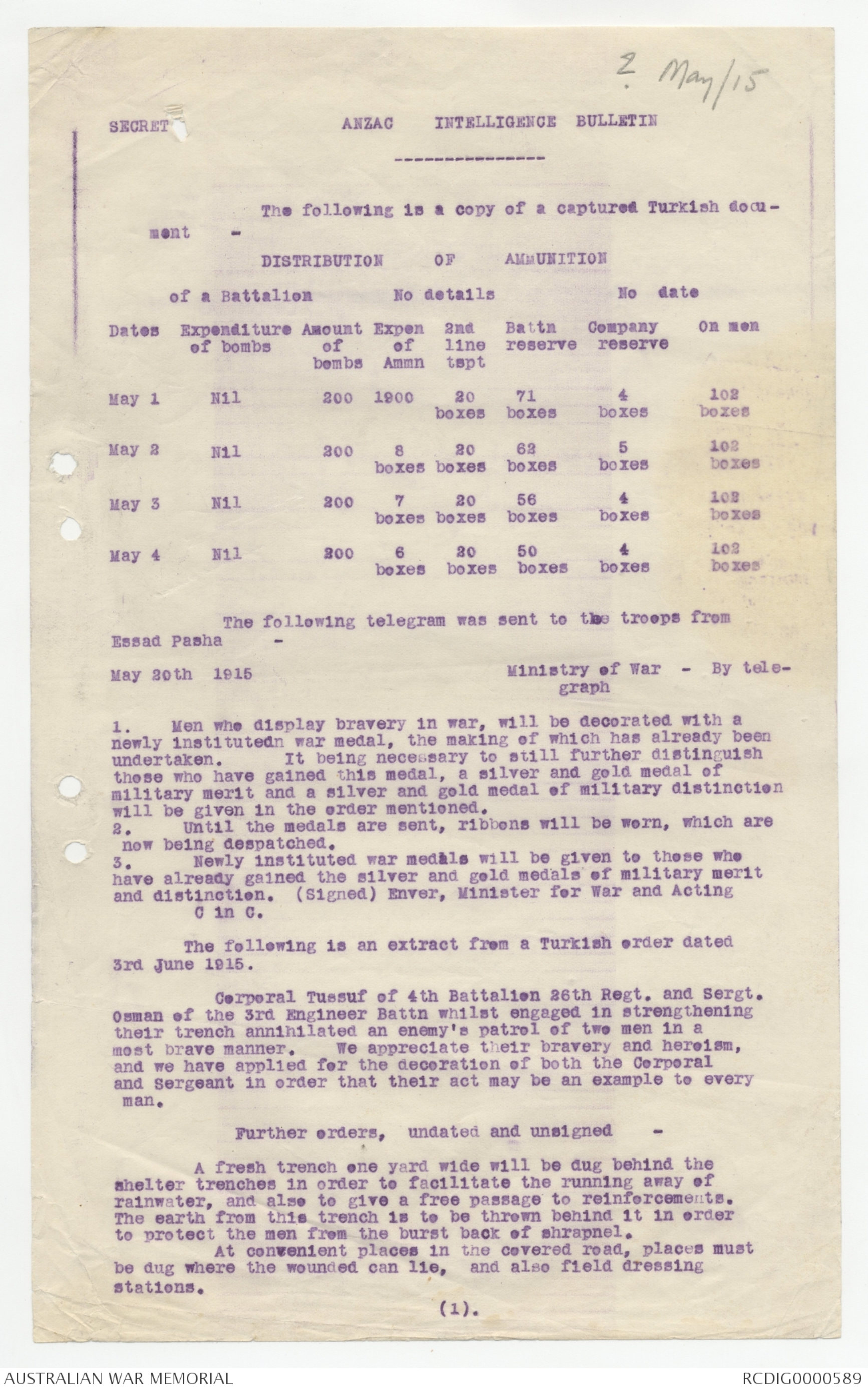
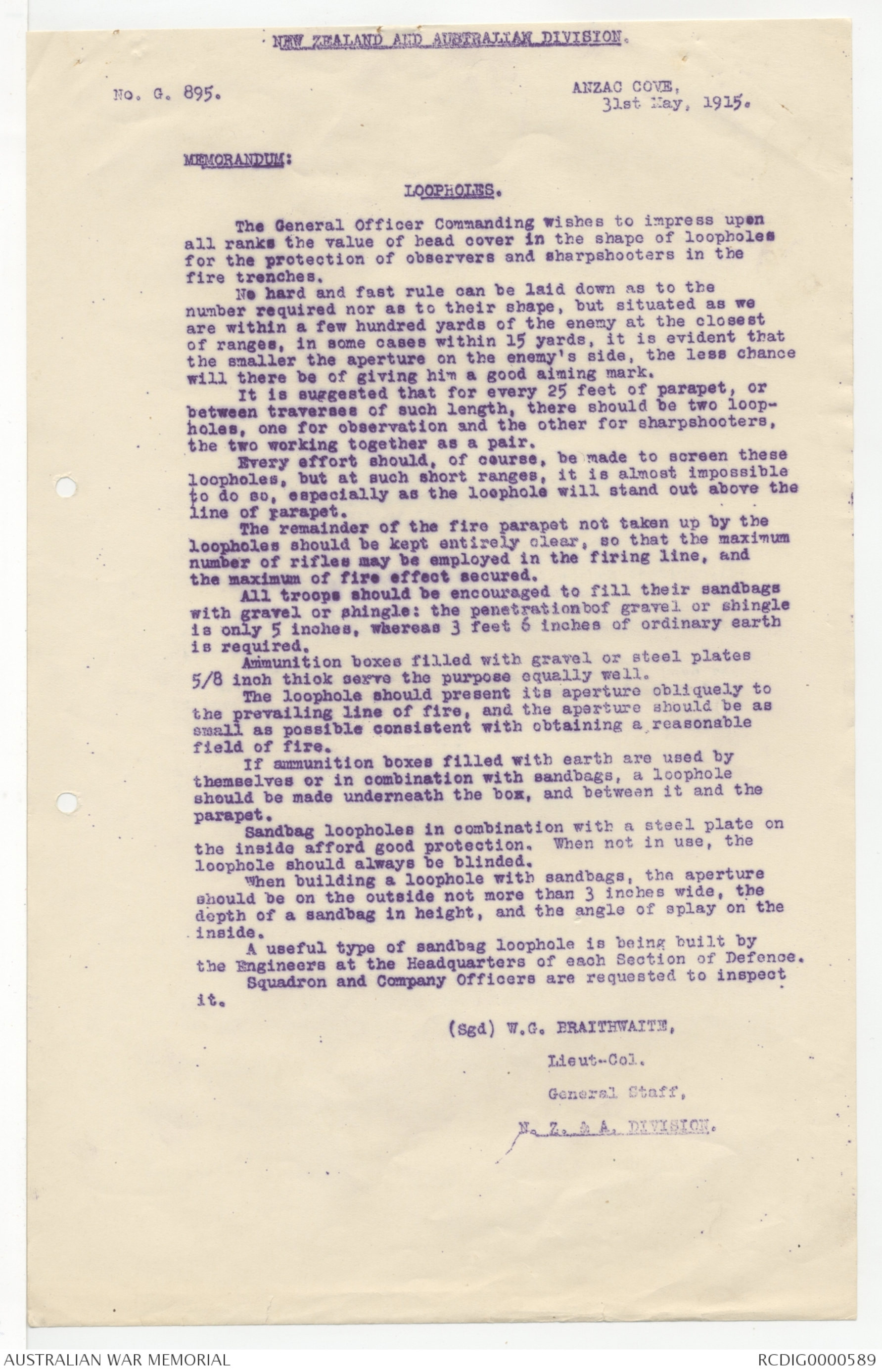
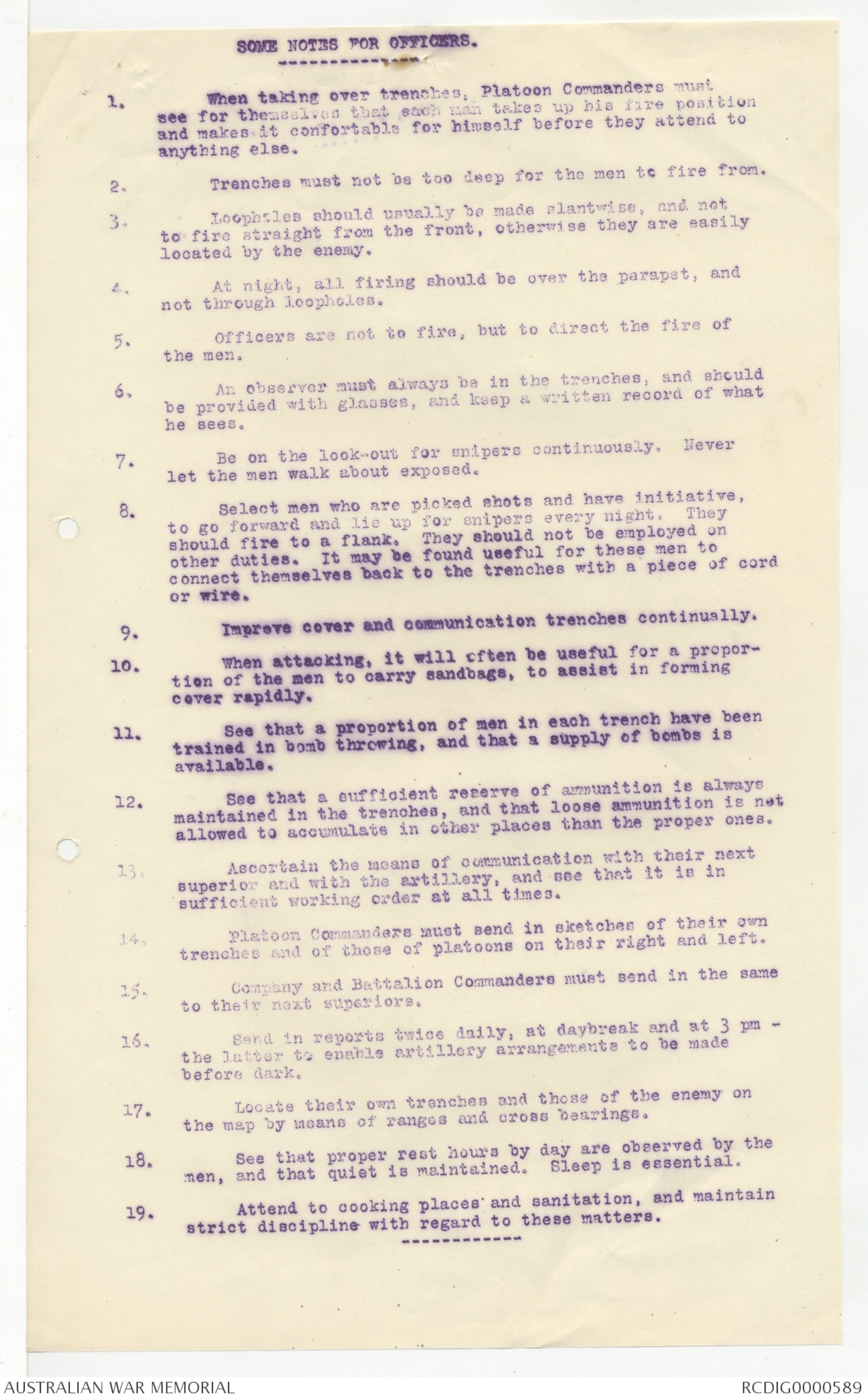
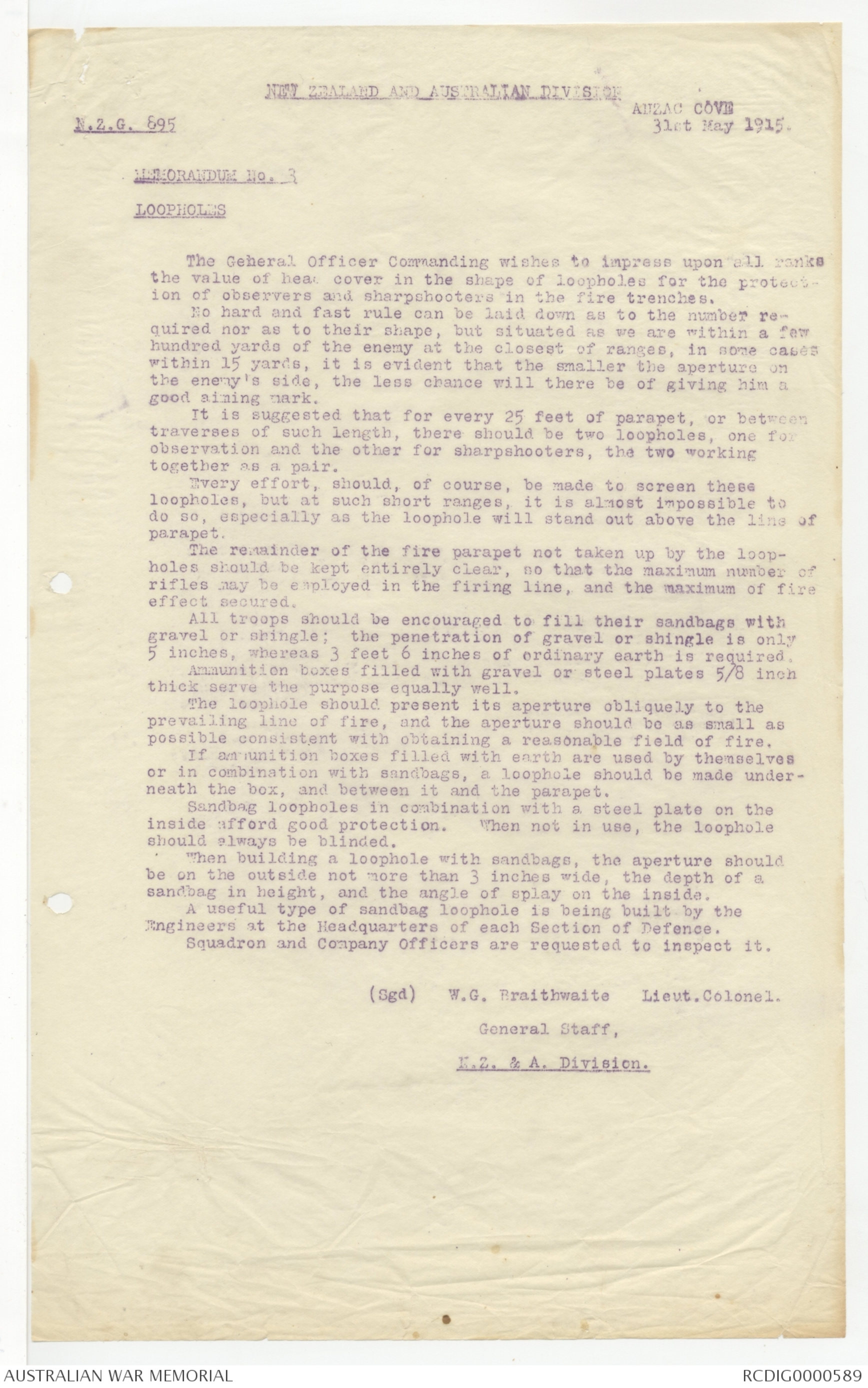
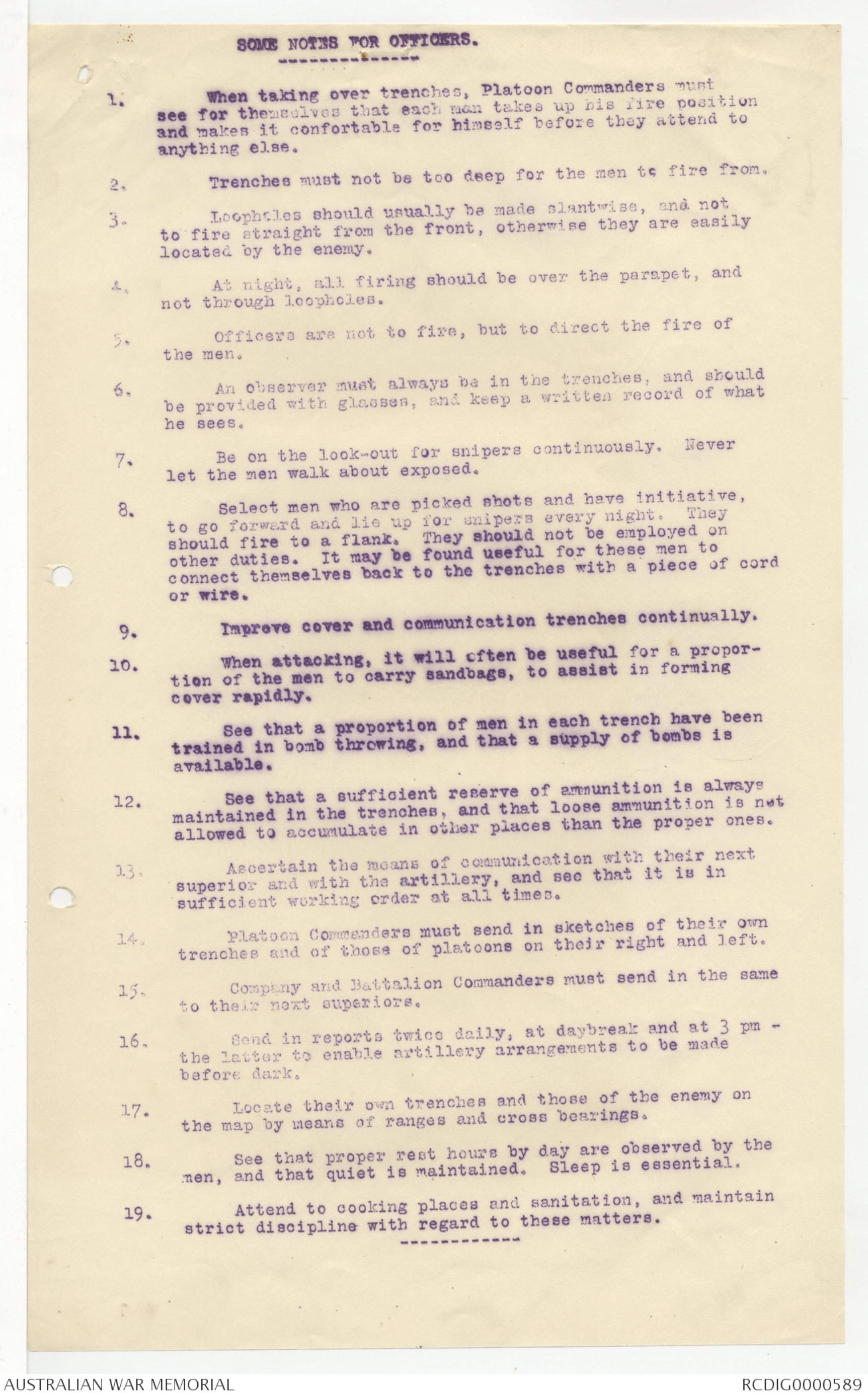
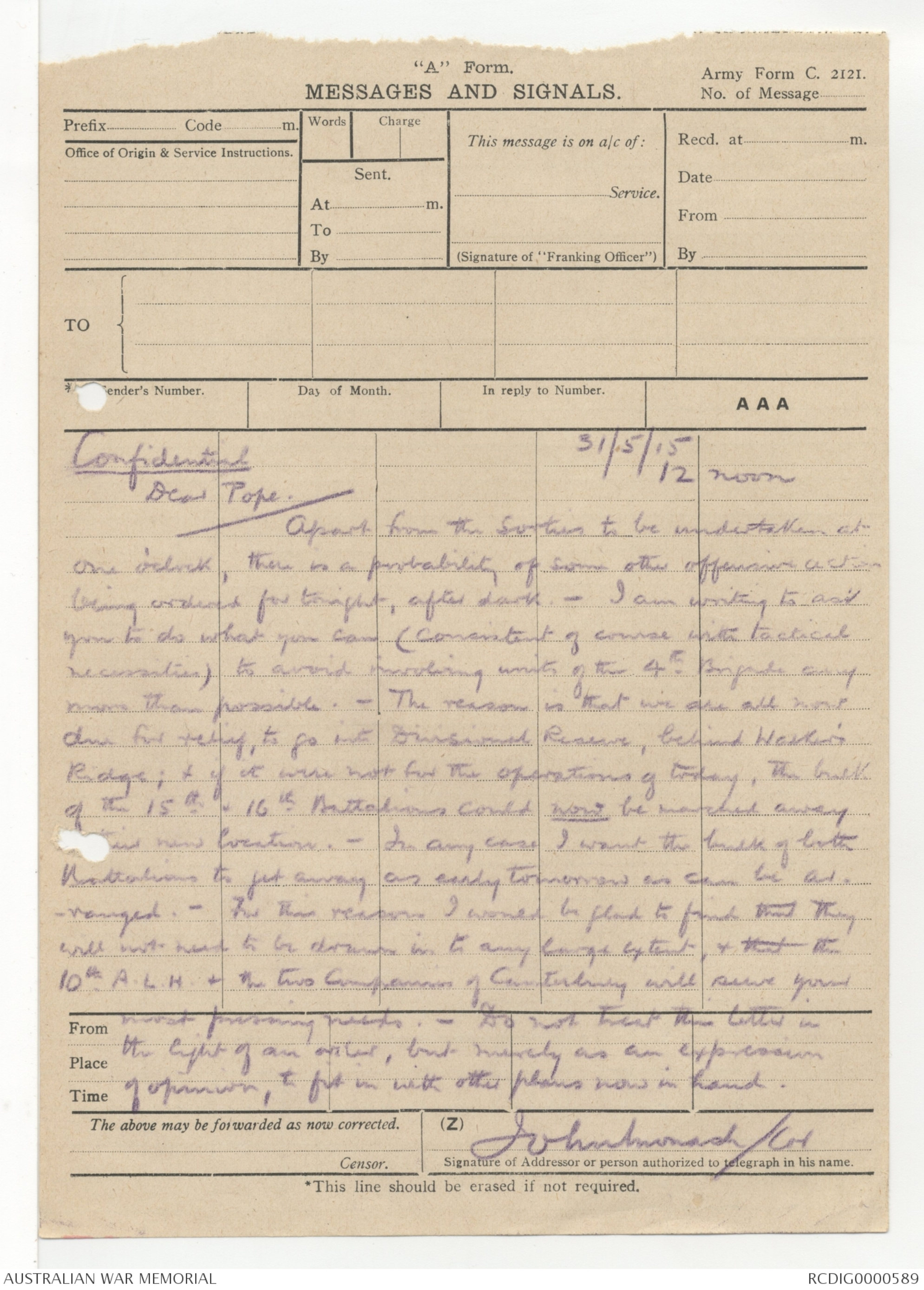
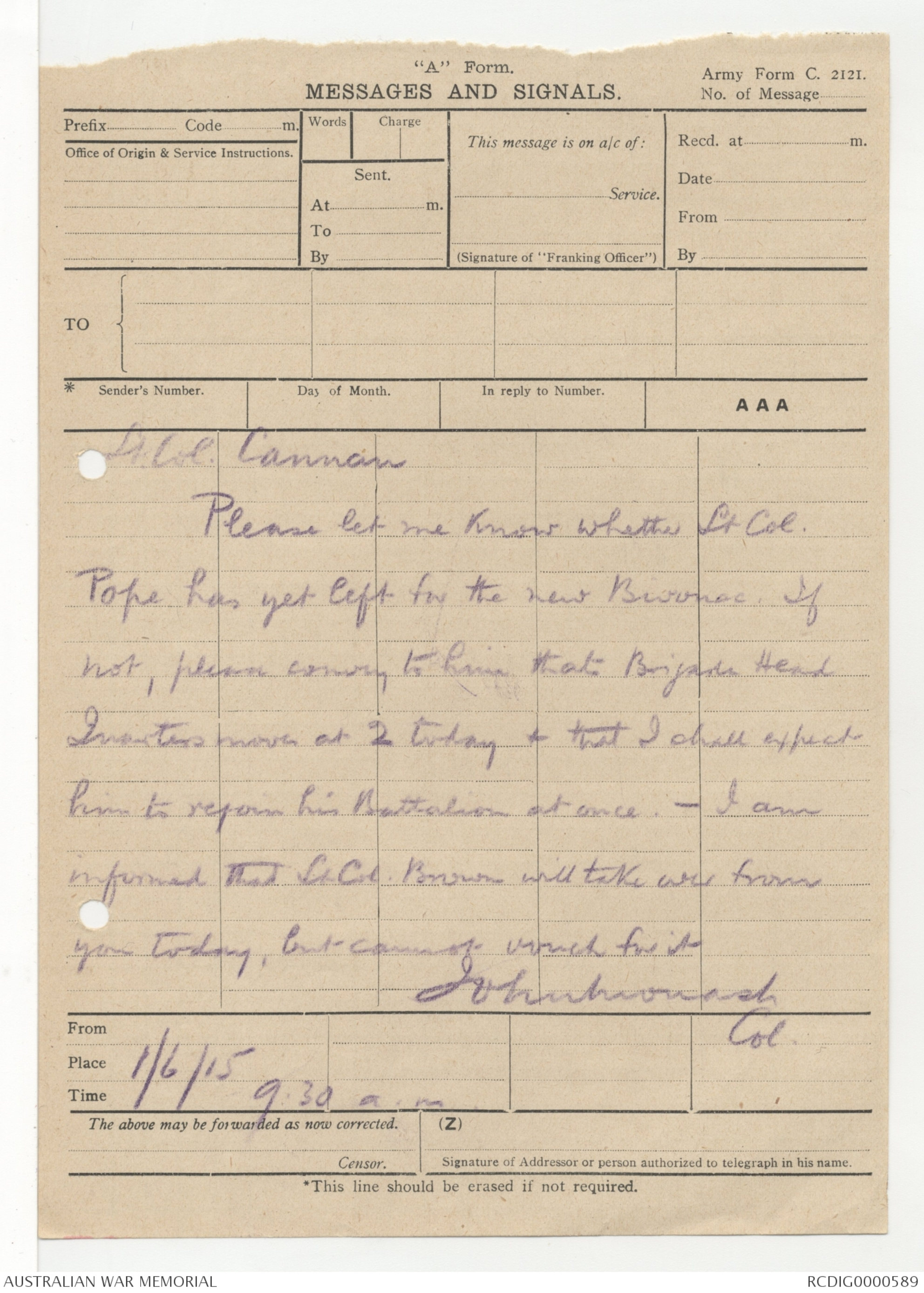
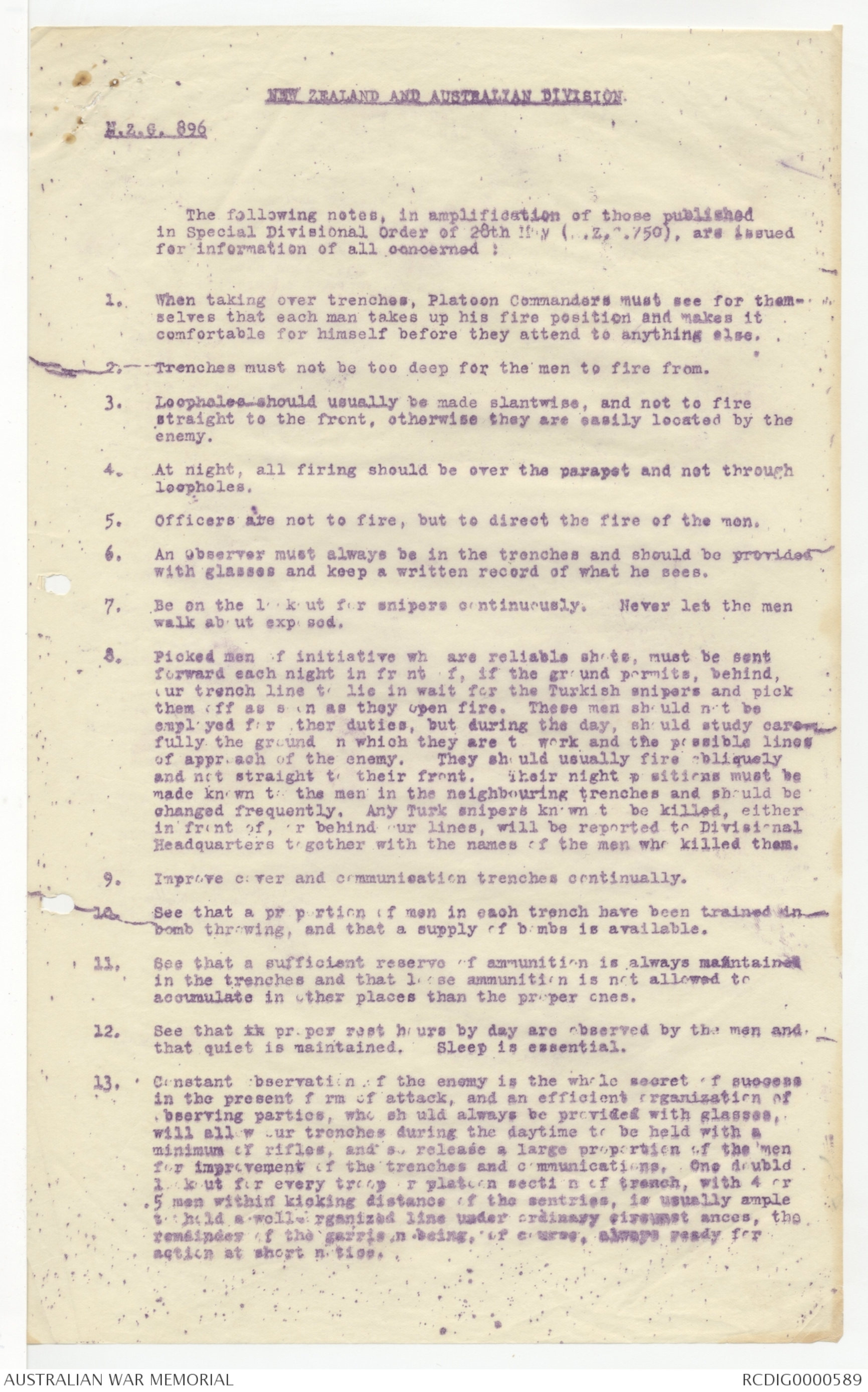
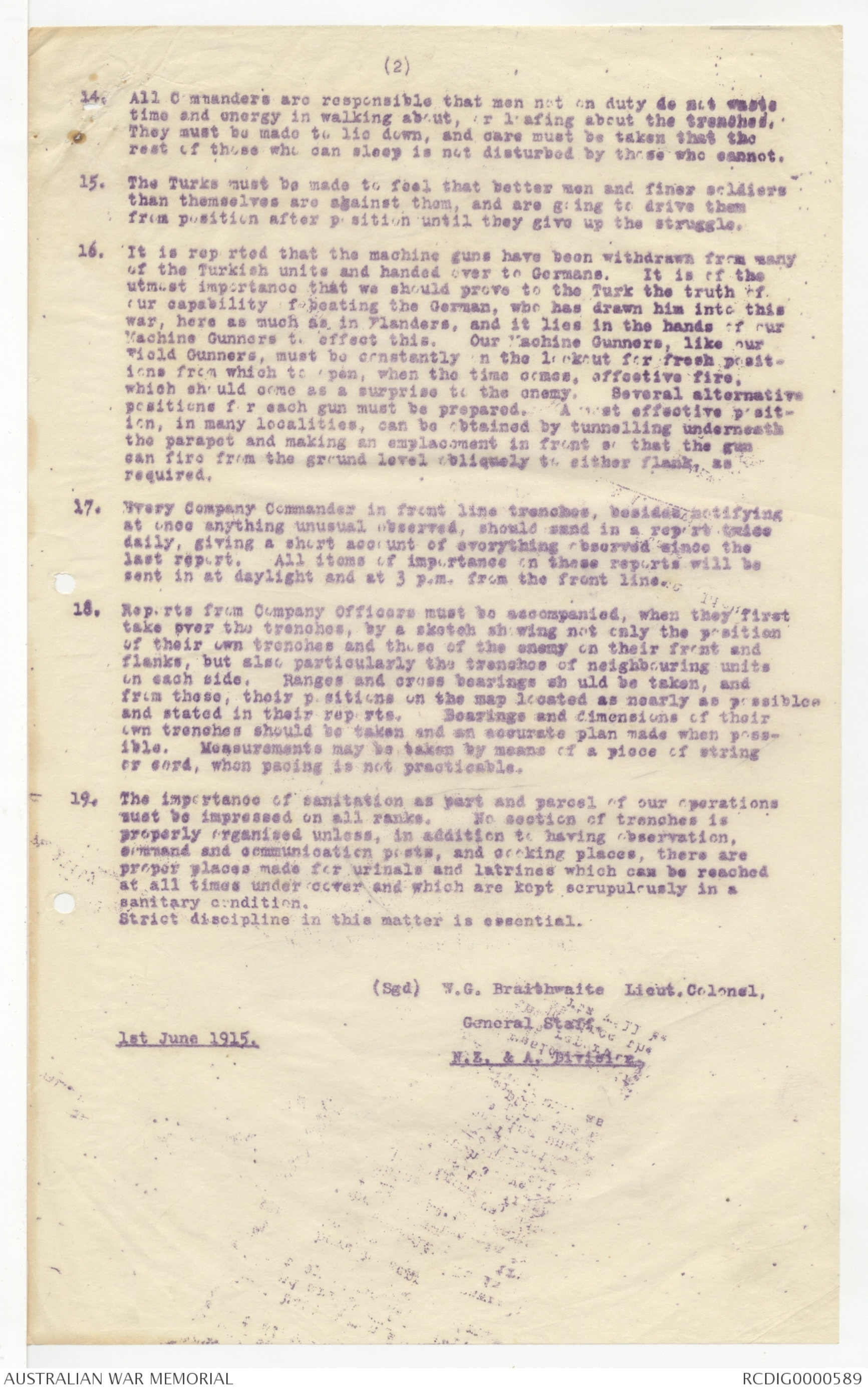
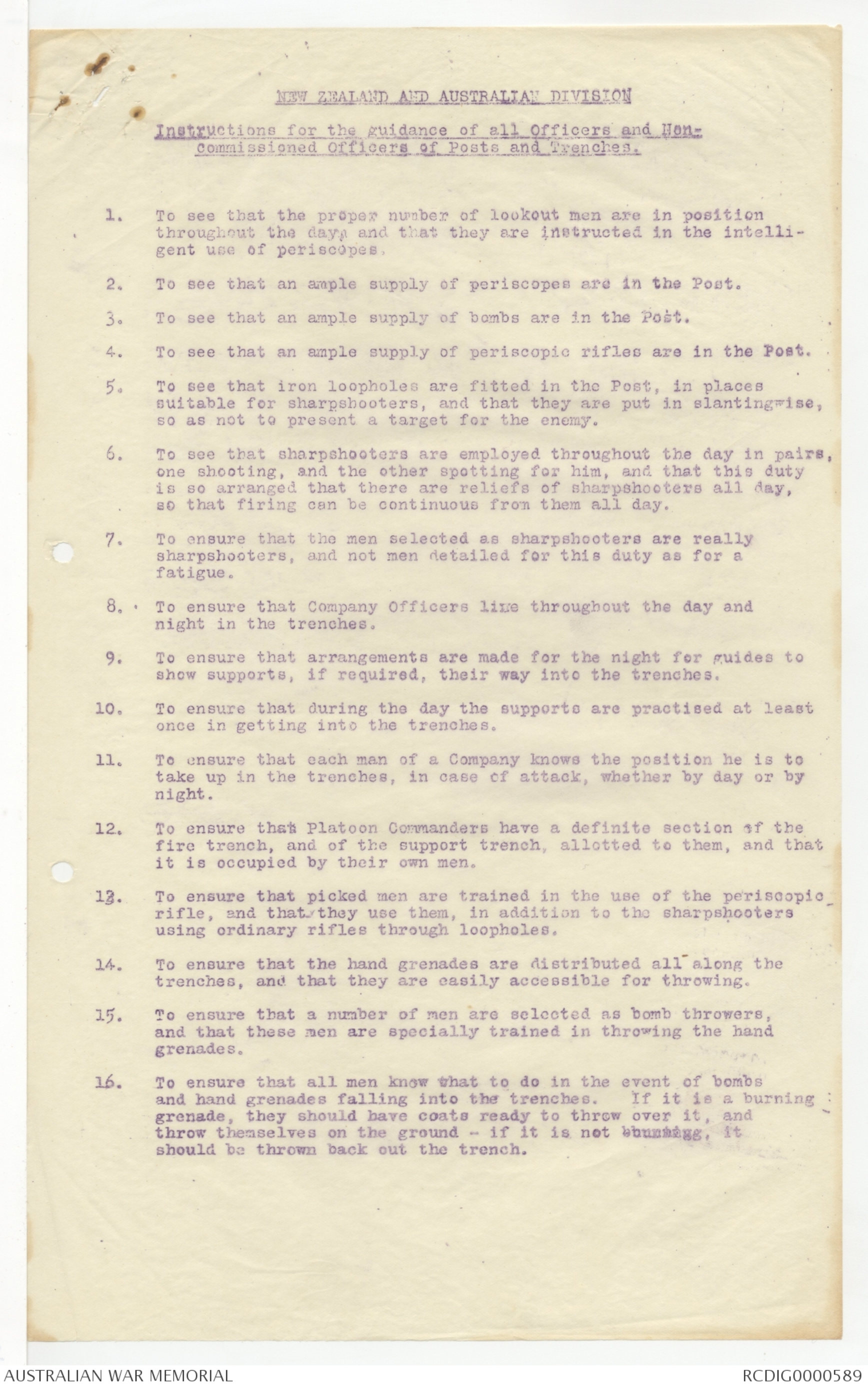
2 May/15
SECRET ANZAC INTELLIGENCE BULLETIN
-----------------------
The following is a copy of a captured Turkish document
DISTRIBUTION OF AMMUNITION
of a Battalion No details No date
| Dates |
Expenditure of bombs |
Amount of bombs |
Expen of Ammn |
2nd line tspt |
Battn reserve |
Company reserve |
On men |
| May 1 | Nil | 200 | 1900 |
20 boxes |
71 boxes |
4 boxes |
102 boxes |
| May 2 | Nil | 200 |
8 boxes |
20 boxes |
62 boxes |
5 boxes |
102 boxes |
| May 3 | Nil | 200 |
7 boxes |
20 boxes |
56 boxes |
4 boxes |
102 boxes |
| May 4 | Nil | 200 |
6 boxes |
20 boxes |
50 boxes |
4 boxes |
102 boxes |
The following telegram was sent to the troops from
Essad Pasha -
May 20th 1915 Ministry of War - By telegraph
-
Men who display bravery in war, will be decorated with a
newly institutedn war medal, the making of which has already been
undertaken. It being necessary to still further distinguish
those who have gained this medal, a silver and gold medal of
military merit and a silver and gold medal of military distinction
will be given in the order mentioned.2. Until the medals are sent, ribbons will be worn, which are
now being despatched.
3. Newly instituted war medals will be given to those who
have already gained the silver and gold medals of military merit
and distinction. (signed) Enver, Minister for War and Acting
C in C.
The following is an extract from a Turkish order dated
3rd June 1915.
Corporal Tussuf of 4th Battalion 26th Regt. and Sergt
Osman of the 3rd Engineer Battn whilst engaged in strengthening
their trench annihilated an enemy's patrol of two men in a most brave manner. We appreciate their bravery and heroism,
and we have applied for the decoration of both the Corporal
and Sergeant in order that their act may be an example to every
man.
Further orders, undated and unsigned -
A fresh trench one yard wide will be dug behind the
shelter trenches in order to facilitate the running away of
rainwater, and also give a free passage to reinforcements.
The earth from this trench is to be thrown behind it in order
to protect the men from the burst back of shrapnel.
At convenient places in the covered road, places must
be dug where the wounded can lie, and also field dressing
stations.(1).
NEW ZEALAND AND AUSTRALIAN DIVISION.
No. G. 895. ANZAC COVE
31st May, 1915.
MEMORANDUM:
LOOPHOLES.
The General Officer Commanding wishes to impress upon
all ranks the value of head cover in the shape of loopholes
for the protection of observer and sharpshooters in the
fire trenches.
No hard and fast rule can be laid down as to the
number required nor as to their shape, but situated as we
are within a few hundred yards of the enemy at the closest
of ranges, in some cases within 15 yards, it is evident that the smaller
the aperture on the enemy's side, the less chance
will there be of giving him a good aiming mark.
It is suggested that for every 25 feet of parapet, or
between traverses of such length, there should be two
loopholes, one for observation and the other for sharpshooters,
the two working together as a pair.
Every effort should, of course, be made to screen these
loopholes, but at such short ranges, it is almost impossible
to do so, especially as the loophole will stand out above the
line of parapet.
The remainder of the fire parapet not taken up by the
loopholes should be kept entirely clear, so that the maximum
number of rifles may be employed in the firing line, and
the maximum of fire effect secured.
All troops should be encouraged to fill their sandbags
with gravel or shingle: the penetrationbof gravel or shingle
is only 5 inches, whereas 3 feet 6 inches of ordinary earth
is required.
Ammunition boxes filled with gravel or steel plates
5/8 inch thick serve the purpose equally well.
The loophole should present its aperture obliquely to
the prevailing line of fire, and the aperture should be as
small as possible consistent with obtaining a reasonable
field of fire.
If ammunition boxes filled with earth are used by
themselves or in combination with sandbags, a loophole
should be made underneath the box, and between it and the
parapet.
Sandbag loopholes in combination with a steel plate on
the inside afford good protection. When not in use, the
loophole should always be blinded.
When building a loophole with sandbags, the aperture
should be on the outside not more than 3 inches wide, the
depth of a sandbag in height, and the angle of splay on the
inside.
A useful type of sandbag loophole is being built by
the Engineers at the Headquarters of each Section of Defence.
Squadron and Company Officers are requested to inspect
it.
(Sgd) W.G. BRAITHWAITE,
Lieut-Col.
General Staff.
N.Z.& A. DIVISION
SOME NOTES FOR OFFICERS.
-
When taking over trenches, Platoon Commanders must
see for themselves that each man takes up his fire position
and makes it comfortable for himself before they attend to
anything else.
2. Trenches must not be too deep for the men to fire from.
3. Loopholes should usually be made slantwise, and not
to fire straight from the front, otherwise they are easily
located by the enemy.
4. At night, all firing should be over the parapet, and
not through loopholes.
5. Officers are not to fire, but to direct the fire of
the men.
6. An observer must always be in the trenches, and should
be provided with glasses, and keep a written record of what
he sees.
7. Be on the look-out for snipers continuously. Never
let the men walk about exposed.
8. Select men who are picked shots and have initiative,
to go forward and lie up for snipers every night. They
should fire to a flank. They should not be employed on
other duties. It may be found useful for these men to
connect themselves back to the trenches with a piece of cord
or wire.
9. Improve cover and communication trenches continually.
10. When attacking, it will often be useful for a
proportion of the men to carry sandbags, to assist in forming
cover rapidly.
11. See that a proportion of men in each trench have been
trained in bomb throwing, and that a supply of bombs is
available.
12. See that a sufficient reserve of ammunition is always
maintained in the trenches, and that loose ammunition is not
allowed to accumulate in other places than the proper ones.
13. Ascertain the means of communication with their next
superior and with the artillery, and see that it is in
sufficient working order at all times.
14. Platoon Commanders must send in sketches of their own
trenches and of those of platoons on their right and left.
15. Company and Battalion Commanders must send in the same
to their next superiors.
16. Send in reports twice daily, at daybreak and at 3 pm -
the latter to enable artillery arrangements to be made
before dark.
17. Locate their own trenches and those of the enemy on
the map by means of ranges and cross bearings.
18. See that proper rest hours by day are observed by the
men, and that quiet is maintained. Sleep is essential.
19. Attend to cooking places and sanitation, and maintain
strict discipline with regard to these matters.---------
NEW ZEALAND AND AUSTRALIAN DIVISION
N.Z.G. 695 ANZAC COVE
31st May 1915
MEMORANDUM NO. 3
LOOPHOLES
The General Officer Commanding wishes to impress upon all ranks
the value of head cover in the shape of loopholes for the
protection of observers and sharpshooters in the fire trenches.
No hard and fast rule can be laid down as to the
number required nor as to their shape, but situated as we
are within a few hundred yards of the enemy at the closest
of ranges, in some cases within 15 yards, it is evident that
the smaller the aperture on the enemy's side, the less chance
will there be of giving him a good aiming mark.
It is suggested that for every 25 feet of parapet, or between
traverses of such length, there should be two loopholes, one for
observation and the other for sharpshooters, the two working
together as a pair.
Every effort, should, of course, be made to screen these
loopholes , but at such short range, it is almost impossible to
do so, especially as the loophole will stand out above the line of
parapet.
The remainder of the fire parapet not taken up by the
loopholes should be kept entirely clear, so that the maximum number of
rifles may be employed in the firing line, and the maximum of fire
effect ensured.
All troops should be encouraged to fill their sandbags with
gravel or shingle; the penetration of gravel or shingle is only
5 inches, whereas 3 feet 6 inches of ordinary earth is required.
Ammunition boxes filled with gravel or steel plates 5/8 inch
thick serve the purpose equally well.
The loophole should present its aperture obliquely to the
prevailing line of fire, and the aperture should be as small as
possible consistent with obtaining a reasonable field of fire.
If ammunition boxes filled with earth are used by themselves
or in combination with sandbags, a loophole should be made
underneath the box, and between it and the parapet.
Sandbag loopholes in combination with a steel plate on the
inside afford good protection. When not in use, the loophole
should always be blinded.
When building a loophole with sandbags, the aperture should
be on the outside not more than 3 inches wide, the depth of a
sandbag in height, and the angle of splay on the inside.
A useful type of sandbag loophole is being built by the
Engineers at the Headquarters of each Section of Defence.
Squadron and Company Officers are requested to inspect it.
(Sgd) W.G. Braithwaite Lieut. Colonel.
General Staff,
N.Z. & A. Division.
SOME NOTES FOR OFFICERS.
1.When taking over trenches, Platoon Commanders must
see for themselves that each man takes up his fire position
and makes it confortable for himself before they attend to
anything else.
2. Trenches must not be too deep for the men to fire from.
3. Loopholes should usually be made slantwise, and not
to fire straight from the front, otherwise they are easily
located by the enemy.
4. At night, all firing should be over the parapet, and
not through loopholes.
5. Officers are not to fire, but to direct the fire of
the men.
6. An observer must always be in the trenches, and should
be provided with glasses, and keep a written record of what
he sees.
7. Be on the look-out for snipers continuously. Never
let the men walk about exposed.
8. Select men who are picked shots and have initiative,
to go forward and lie up for snipers every night. They
should fire to a flank. They should not be employed on
other duties. It may be found useful for these men to
connect themselves back to the trenches with a piece of cord
or wire.
9. Improve cover and communication trenches continually.
10. When attacking, it will often be useful for a
proportion of the men to carry sandbags, to assist in forming
cover rapidly.
11. See that a proportion of men in each trench have been
trained in bomb throwing, and that a supply of bombs is
available.
12. See that a sufficient reserve of ammunition is always
maintained in the trenches, and that loose ammunition is not
allowed to accumulate in other places than the proper ones.
13. Ascertain the means of communication with their next
superior and with the artillery, and see that it is in
sufficient working order at all times.
14. Platoon Commanders must send in sketches of their own
trenches and of those of platoons on their right and left.
15. Company and Battalion Commanders must send in the same
to their next superiors.
16. Send in reports twice daily, at daybreak and at 3 pm -
the latter to enable artillery arrangements to be made
before dark.
17. Locate their own trenches and those of the enemy on
the map by means of ranges and cross bearings.
18. See that proper rest hours by day are observed by the
men, and that quiet is maintained. Sleep is essential.
19. Attend to cooking places and sanitation, and maintain
strict discipline with regard to these matters.
-----------
"A" Form
MESSAGES AND SIGNALS
Army Form C. 2121.
No. of Message..........
Confidential 31/5/15
12 noon
Dear Pope
Apart from the Sorties to be undertaken at
one o'clock, there is a probability of some other offensive action
being ordered for tonight, after dark. - I am writing to ask
you to do what you can (consistent of course with tactical
necessities) to avoid involving units of the 4th Brigade any
more than possible. - The reason is that we are all now
due for relief, to go into Divisional Reserve, behind Walker's
Ridge; & if it were not for the operations of today, then both
of the 15th & 16th Battalions could now be marched away
[[?]] new location. In any case I want the bulk of both
Battalions to get away as early tomorrow as can be
arranged. - For this reason I would be glad to find that they
will not need to be thrown in to any large extent, & that the
10th A.L.H. & the two Companies of Canterbury will serve your
most pressing needs. - Do not treat this letter in
the light of an order, but merely as an expression
of opinion, to fit in with other plans now in hand.
John Monash / Col
"A" Form
MESSAGES AND SIGNALS
Army Form C. 2121.
No. of Message..........
Lt. Col. Cannan
Please let me know whether Lt Col.
Pope has yet left for the new Bivouac. If
not, please convey to him that Brigade Head
Quarters move at 2 today & that I shall expect
him to rejoin his Battalion at once. - I am
informed that LtCol. Brown will take over from
you today, but cannot vouch for it.
John Monash
Col.
1/6/15
9.30 a.m.
NEW ZEALAND AND AUSTRLIAN DIVISION
N.Z.G. 896
The following notes, in amplification of those published
in Special Divisional Order of 28th May (N.Z.G. 750), are issued
for information of all concerned:
1. When taking over trenches, Platoon Commanders must see for
themselves that each man takes up his fire position and makes it
comfortable for himself before they attend to anything else.
2. Trenches must not be too deep for the men to fire from.
3. Loopholes should usually be made slantwise, and not to fire
straight to the front, otherwise they are easily located by the
enemy.
4. At night, all firing should be over the parapet and not through
loopholes.
5. Officers are not to fire, but to direct the fire of the men.
6. An observer must always be in the trenches and should be provided
with glasses and keep a written record of what he sees.
7. Be on lookout for snipers continuously. Never let the men
walk about exposed.
8. Picked men of initiative who are reliable shots, must be sent
forward each night in front of, if the ground permits, behind
our trench lines to lie in wait for the Turkish snipers and pick
them off as soon as they open fire. These men should not be
employed for other duties, but during the day, should study
carefully the ground n which they are to work and the possible lines
of approach of the enemy, They should usually fire obliquely
and not straight to their front. Their night positions must be
made known to the men in the neighbouring trenches and should be
changed frequently. Any Turk snipers known to be killed, either
in front of, or behind our lines,will be reported to Divisional
Headquarters together with the names of the men who killed them.
9. Improve cover and communication trenches continually.
10. See that a proportion of men in each trench have been trained in
bomb throwing, and that a supply of bombs is available.
11. See that a sufficient reserve of ammunition is always maintained
in the trenches and that loose ammunition is not allowed to
accumulate in other places than the proper ones.
12. See that in proper rest hours by day are observed by the men and
that quiet is maintained. Sleep is essential.
13. Constant observation of the enemy is the whole secret of success
in the present form of attack, and an efficient organization of
observing parties, who should always be provided with glasses,
will allow our trenches during the daytime to be held with a
minimum of rifles, and so release a large proportion of the men
for improvement of the trenches and communications, One doubld
lookout for every troop or platoon section of trench, with 4 or
5 men within kicking distance of the sentries, is usually ample
to hold a well organized line under ordinary circumstances, the
remainder of garrison being of course, always ready for
action at short notice.
(2)
14. All Commanders are responsible that men not on duty do not waste
time and energy in walking about, or loafing about the trenches.
They must be made to lie down, and care must be taken that the
rest of those who can sleep is not disturbed by those who cannot.
15. The Turks must be made to feel that better men and finer soldiers
than themselves are against them, and are going to drive them
from position after position until they give up the struggle.
16. It is reported that the machine guns have been withdrawn from many
of the Turkish units and handed over to Germans. It is of the
utmost importance that we should prove to the Turk the truth of
our capability of beating the German, who has drawn him into this
war, here as much as in Flanders, and it lies in the hands of our
Machine Gunners to effect this. Our Machine Gunners, like our
Field Gunners, must be constantly on the lookout for fresh
positions from which to open, when the time comes, effective fire,
which should come as a surprise to the enemy. Several alternative
positions for each gun must be prepared. A most effective
position, in many localities, can be obtained by tunnelling underneath
the parapet and making an emplacement in front so that the gun
can fire from the ground level obliquely to either flank, as
required.
17. Every Company Commander in front line trenches, besides
notifying at once anything unusual observed, should send in a report twice
daily, giving a short account of everything observed since the
last report. All items of importance in these reports will be
sent in at daylight and at 3 p.m. from the front line.
18.Reports from Company Officers must be accompanied, when they first
take over the trenches, by a sketch showing not only the position
of their own trenches and those of the enemy on their front and
flanks, but also particularly the trenches of neighbouring units
on each side. Ranges and cross bearings should be taken, and
from these, their positions on the map located as nearly as possible
and stated in their reports. Bearings and dimensions of their
own trenches should be taken and an accurate plan made when
possible. Measurements may be taken by means of a piece of string
or cord, when pacing is not practicable.
19. The importance of sanitation as part and parcel of our operations
must be impressed on all ranks. No section of trenches is
properly organised unless, in addition to having observation,
command and communication posts, and cooking places, there are
proper places made for urinals and latrines which can be reached
at all times under cover and which are kept scrupulously in a
sanitary condition.
Strict discipline in this matter is essential.
(Sgd) W.G. Braithwaite Lieut. Colonel.
General Staff
N.Z. & A. Division
1st June 1915
NEW ZEALAND AND AUSTRALIAN DIVISION
Instructions for the guidance of all Officers and Non-
Commissioned Officers of Posts and Trenches.
1. To see that the proper number of lookout men are in position
throughout the days and that they are instructed in the
intelligent use of periscopes.
2. To see that an ample supply of periscopes are in the Post.
3. To see that an ample supply of bombs are in the Post.
4. To see that an ample supply of periscopic rifles are in the Post.
5. To see that iron loopholes are fitted in the Post, in places
suitable for sharpshooters, and that they are put in slantingwise,
so as not to present a target for the enemy.
6. To see that sharpshooters are employed throughout the day in pairs,
one shooting, and the other spotting for him, and that this duty
is so arranged that there are reliefs of sharpshooters all day,
so that firing can be continuous from them all day.
7. To ensure that the men selected as sharpshooters are really
sharpshooters, and not men detailed for this duty as for a
fatigue.
8. To ensure that Company Officers line throughout the day and
night in the trenches.
9. To ensure that arrangements are made for the night for guides to
show supports, if required, their way into the trenches.
10. To ensure that during the day the supports are practised at least
once in getting into the trenches.
11. To ensure that each man of a Company knows the position he is to
take up in the trenches, in case of attack, whether by day or by
night.
12. To ensure that Platoon Commanders have a definite section of the
fire trench, and of the support trench, allotted to them, and that
it is occupied by their own men.
13. To ensure that picked men are trained in the use of the periscopic
rifle, and that they use them, in addition to the sharpshooters
using ordinary rifles though loopholes.
14. To ensure that the hand grenades are distributed all along the
trenches, and that they are easily accessible for throwing.
15. To ensure that a number of men are selected as bomb throwers,
and that these men are specially trained in throwing the hand
grenades.
16. To ensure that all men know what to do in the event of bombs
and hand grenades falling into the trenches. If it is a burning
grenade, they should have coats ready to throw over it, and
throw themselves on the ground - if it is not burning, it
should be thrown back out the trench.
 Marj Moodie
Marj MoodieThis transcription item is now locked to you for editing. To release the lock either Save your changes or Cancel.
This lock will be automatically released after 60 minutes of inactivity.